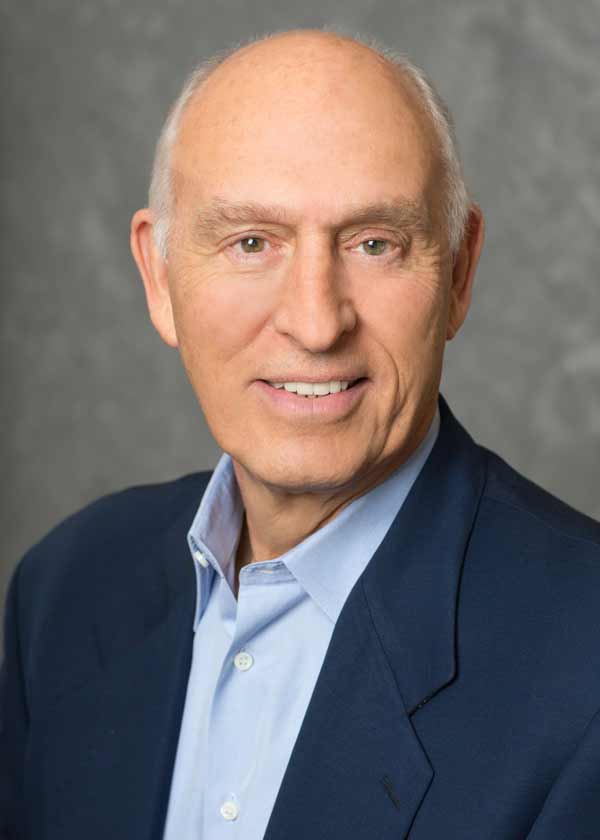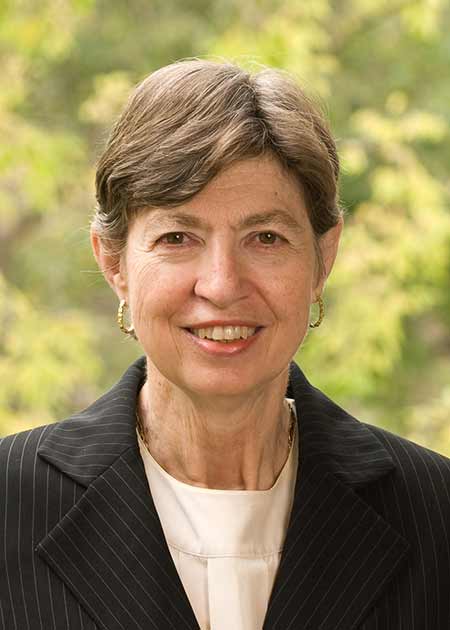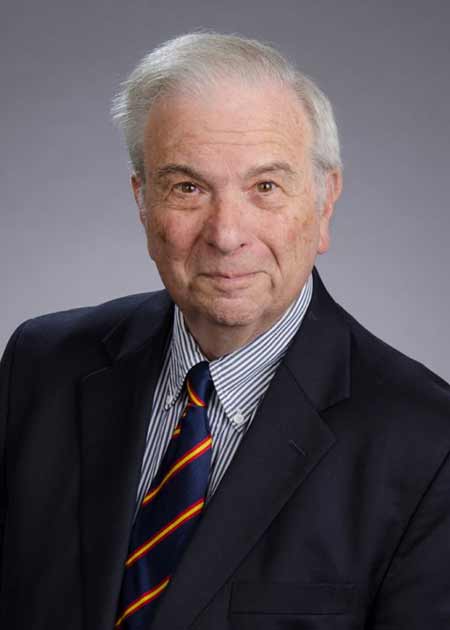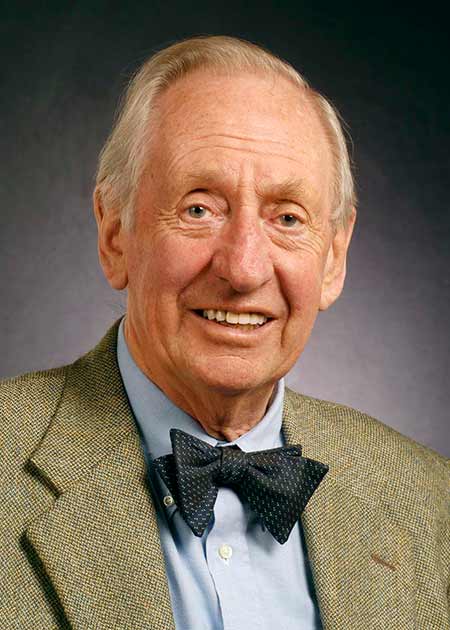
By:
- Jade Griffin
Published Date
By:
- Jade Griffin
Share This:
2018 Revelle Medal Recipients Announced
Honorees recognized for helping establish UC San Diego as top research university
One is a former chancellor who shattered glass ceilings. Another participated in an historic trek up Mount Everest to make the first physiological measurements on its summit. Yet another was instrumental to President Barack Obama’s Brain Research through Advancing Innovation Neurotechnologies (BRAIN) Initiative. Still another established UC San Diego as a powerhouse in political science education and research. These four remarkable individuals all have two things in common: they played significant roles in making UC San Diego the top-ranked university it is today and they will be honored as recipients of the 2018 Revelle Medal. This year’s Revelle Medalists are Marye Anne Fox; John B. West, M.D.; Robert Conn; and Sanford (Sandy) Lakoff.
Chancellor Pradeep K. Khosla will bestow the awards upon the honorees during UC San Diego’s Founders Celebration—an annual celebration of the university’s founding in 1960—slated this year for Nov. 15-17, 2018.
“Founders Celebration is a special time each year that allows us to thank and honor the leaders and visionaries who have helped make UC San Diego one of the top 15 research universities in the world,” said Chancellor Khosla. “This year’s award recipients have played key roles in leading the campus and sparking meaningful research, discoveries and community partnerships that have transformed the fields of engineering, chemistry, political science and medicine.”
The Revelle Medal—created in honor of Roger Revelle, who helped establish UC San Diego during his tenure from 1950-1964 as director of Scripps Institution of Oceanography—honors the contributions of current and former faculty members to UC San Diego.
The 2018 Revelle Medal recipients include:

Robert W. Conn
Robert W. Conn, Ph.D., is credited with guiding the Jacobs School of Engineering through a transformative period of growth and recognition as its dean, positioning the school to reach and maintain the high ranking it has today. He also oversaw the formation of the Center for Wireless Communications and the California Institute of Telecommunications and Information Technology (Calit2), now the Qualcomm Institute. He worked with the Bioengineering Department to build Powell-Focht Bioengineering Hall, the first privately funded academic building on the general campus. Since his retirement from UC San Diego, he has remained a formidable force at the nexus of research and philanthropy, and currently leads The Kavli Foundation.
When Conn first joined the Jacobs School of Engineering in 1994, he understood that the school needed to serve as a conduit between research discoveries and the companies that could deploy them for the common good. As a result, Conn established the Corporate Affiliates Program on campus, as well as the William von Liebig Center for Entrepreneurimed and Technology Advancement. He oversaw a period of unprecedented growth, with a 60 percent increase in faculty, a 70 percent increase in graduate students, and a 50 percent growth in undergraduate students. This was accompanied by a steady rise in rankings. In 2003, the year Conn retired, the Jacobs School was ranked 11th in the country, a position it maintains today. He also helped inspire philanthropic support, including the historic $15 million gift in 1997 from Irwin and Joan Jacobs to establish the school’s endowment. In recognition of their gift, the school was named for them.
Today, Conn serves as president and CEO of The Kavli Foundation, which is dedicated to advancing basic science and whose programs include a worldwide network of renowned research institutes, as well as the international Kavli Prizes – now one of the most prestigious awards in science. It is also a leader in efforts to improve the public understanding and appreciation of science. With Conn at the helm, The Kavli Foundation played a significant role in catalyzing the U.S. Brain Research through Advancing Innovative Neurotechnologies (BRAIN) Initiative. Under Conn’s leadership, Kavli was a co-founder of the Science Philanthropy Alliance, which aims to increase philanthropic giving for basic science. Today, he serves as chair of the Alliance’s Board of Directors. The Kavli Foundation established the Kavli Institute for Brain and Mind (KIBM) at UC San Diego and the Salk Institute. KIBM seeks to push disciplinary boundaries to further our understanding of the origins, evolution and mechanimeds of human cognition, from the brain’s physical and biochemical machinery to the experiences and behaviors we call the mind.

Marye Anne Fox
Marye Anne Fox, Ph.D., the seventh chancellor of UC San Diego and the first woman to be appointed as permanent chancellor, led the university during an historic era of extraordinary campus growth and unprecedented financial challenges. During her tenure as chancellor from 2004-2012, she assembled a diverse leadership team and set a visionary course for UC San Diego’s next 50 years and beyond. Under her leadership, UC San Diego successfully completed a $1 billion capital campaign and celebrated its 50th anniversary; campus climate was improved; and university programs and resources expanded at a record-setting pace to accommodate increasing numbers of students and a $1 billion research enterprise.
A world-renowned chemist, Fox is also a distinguished professor emerita of chemistry at UC San Diego. Fox is one of the nation’s most creative physical organic chemists, having published extensively in organic photochemistry and electrochemistry. Her work has application in materials science, solar energy conversion and environmental chemistry. Before her appointment as UC San Diego’s chancellor, Fox served as chancellor at North Carolina State University, and vice president for Research at the University of Texas at Austin.
In October 2010, President Barack Obama awarded Fox the National Medal of Science, the highest honor bestowed by the United States government on scientists, engineers and inventors. She has also received honorary degrees from 12 institutions in the U.S. and abroad.

Sanford (Sandy) Lakoff
More than four decades ago in 1974, Sanford (Sandy) Lakoff, Ph.D., joined UC San Diego as a professor and founding chair of the Department of Political Science. Under his leadership, the department quickly established high quality undergraduate and graduate degree programs. He recruited talented faculty members who would help him lead the department’s impressive rise to become one of the best political science departments in the nation. Today, the Department of Political Science and several of its doctoral field specializations are ranked among the top 10 in the nation.
Lakoff’s impact did not stop there. He was instrumental in promoting campus-wide programs which recognized the distinctive geographic location of the campus and its opportunity to affirm a leadership role in border and Pacific Rim Studies. He was a strong advocate for the establishment of the Center for U.S.-Mexican Studies and the Institute of the Americas. His contributions also helped lay the groundwork for the establishment of the School of Global Policy and Strategy (formerly the School of International Relations and Pacific Studies).
Throughout his years on campus, Lakoff also played a key role in establishing UC San Diego’s presence in the San Diego community, for which he was recognized with a Chancellor’s Associates’ Award for Community Service. Even since his retirement in 1992, Lakoff has continued to demonstrate his commitment to UC San Diego. He has served on many campus committees, and has served as president of the UC San Diego Emeriti Association and editor of the Emeriti Association newsletter.

John B. West
John B. West, M.D. Ph.D., is one of the world’s most noted physiologists for his work in respiratory physiology. While working as a physician in London in 1956, the Australian native began to study how gravity affected blood flow in the lungs.
Four years later, he learned that Sir Edmund Hillary was planning a physiological expedition to the Himalayas, and he applied and was accepted to what is now called the Silver Hut expedition. He joined a small group of physiologists who studied the effects of low oxygen levels at an altitude of 19,000 feet. West’s long interest in high-altitude medicine and physiology culminated in him leading the 1981 American Medical Research Expedition to Mount Everest, during which five people reached the summit, and the first physiological measurements on the summit were made. He also worked from 1967 to 1968 at the NASA Ames Research Center, where he submitted a proposal to study pulmonary function in astronauts. The program was approved and funded until 2006.
West joined the UC San Diego School of Medicine faculty in 1969, where he continues to his work. Currently, he is addressing the basic biological question of how the blood-gas barrier of the lung is regulated so that it is sufficiently thin for efficient gas exchange, yet strong enough to avoid stress failure. His book, “Respiratory Physiology: The Essentials,” has been translated into 15 languages and is used around the world. He has also created an archival collection of material in high-altitude medicine and physiology for the UC San Diego Library.
View a full list of Revelle Medalists from past years.
Share This:
You May Also Like
Stay in the Know
Keep up with all the latest from UC San Diego. Subscribe to the newsletter today.


